"The world is made for people who aren't cursed with self-awareness." –Annie Savoy, character portrayed by Susan Sarandon in the film, Bull Durham
Perhaps not the world in which everyone else lives, but certainly the world of Hollywood
What makes a labour strike in Hollywood the source of all kinds of mockery and ridicule is because as accustomed as people are to consuming the entertainment Tinsel Town produces, ultimately it is not an industry that is essential to everyday life and civilization.
As has been stated in an earlier essay, film & TV entertainment is a luxury industry of nations that are highly economically developed. Even if allowing that entertainment is essential to our civilization, there are many way for us to provide it to and for ourselves. Movies and TV shows are merely options.
So, while I do my best to keep these daily dispatches light, most of the reports, while serious and earnest, do more to expose the hypocrisy and narcissism of the actors and writers on strike.
To predict the future, study the past. True in 1960, true now.
One big difference in the creative community then and now was that the collective bargaining process was far more diffuse. SAG and the WGA both negotiated separate contracts for film work and for TV work, with separate bargaining agencies for the studios. Broadly speaking, the Association of Motion Picture Producers represented the largest studios and production groups for film-related contracts. The Alliance of Television Film Producers handled duties for small-screen deals. That’s a sharp contrast to the past 40-odd years, when virtually all Hollywood union contracts flow through the Alliance of Motion Picture and Television Producers.
Smaller entities, and more of them. It seems like less distance between the leadership and the rank-and-file, and perhaps less acrimony between the unions and the studios.
Adding to the confusion in filmdom, unions were more likely back then to negotiate deals with individual studios and production companies, or in some cases clusters of small and medium-sized producers that banded together to negotiate as a unit. United Artists in this era served as a distributor and bargaining agent clearinghouse for numerous indie producers, hence references in Variety stories to ‘the UA indies.’ All of that made it harder for industry insiders to keep tabs on the state of work stoppages and contract talks at any given time. While contracts that run in three-year durations are the industry standard these days, 60-odd years ago the time span of pacts seemed to range from three to six years.
More centralization equates to a greater amount of control. We see that everywhere, don’t we? Look around.
Representing some 47,000 members, Equity put out a joint-statement saying that it stood in ‘unwavering solidarity’ with SAG-AFTRA and its members in their ‘effort to achieve a fair and equitable contract, and for the good of performers working around the world. The union added they would support SAG-AFTRA ‘by all legal means.’
Unfortunately for Equity, ‘by all legal means’ doesn’t offer a huge amount of room for maneuvering thanks to strike laws in the U.K., laws that union boss Paul W. Fleming labeled ‘draconian’ and are considered among the most restrictive in the Western world (something expressed by former Prime Minister Tony Blair back in 1997).
This may or may not be something the leadership of the two unions considered, and it may or may not be a valid point – but if I’m the head of a studio, or production company, I’m asking myself why I don’t produce my movies and/or TV shows in the UK? Given the laws, it’s likely I don’t have to worry about a work stoppage bringing production to a halt.
Calling a strike isn’t a straightforward move in the U.K. Before any industrial action can be held, the union must hold a postal vote with a majority of members supporting a strike. But there is also further ‘complex legislation around this process,’ which must be complied with.
Among the less than productive consequences of this strike is that, by shutting down production, opportunity is being created for other countries’ film and TV industries to fill the void.
As Parsons explained, this means that even by simply refusing to cross a picket line, ‘workers may be subject to disciplinary action, including dismissal and/or a claim for breach of contract.
As it happens, even Equity actors who have tuned up for work have seen productions that they’re in ground to a halt, especially those with SAG-AFTRA actors in principal roles. THR hears of projects with two call sheets — one with their SAG leads and one without — with filmmakers attempting to get through as much as possible without their SAG-AFTRA talent before they run out of things to shoot.
One of the first reasons she cites is healthcare explaining that ‘to qualify for healthcare you have to earn over $26,000,’ noting that ‘87% of actors working in this industry in America do not earn enough to qualify for healthcare.’
Fair enough. That does indeed suck.
‘The Meryl Streeps and the Tom Cruises are 0.2% of all actors working in this industry today,’ she added.
Okay…but tell me that isn’t why she aspired to be an actress in Hollywood in the first place – she wants to be in that .2% – nothing wrong with that, but is she begrudging the Meryl Streeps and Tom Cruises their success? In the event that one day she is among that .2%, will she be compelled to willingly share her wealth with another actor or actress, or more than one, who hasn’t paid the dues she did?
This is where the hypocrisy and lack of self-awareness exceeds my ability to grasp. Are the Meryl Streeps, Mark Ruffalos, Jennifer Lawrences, Martin Shorts, et al. who decry the inequity and condemn the greed of the studio heads, willing to part with any of their net worth to support their struggling fellow actors and actresses? They are no less greedy than the studio heads they are all too willing to demonize, but for some reason, they get a pass.
Again, there are no good guys, here.
Yashere said that writers have to earn $40k a year to qualify for healthcare benefits, but 92% of writers don’t earn enough to get those benefits.
‘Did you know there are people within these networks who are being paid more money for scheduling TV shows than the people that actually created the TV shows that they’re scheduling? It’s nonsensical,’ she noted.
What does that tell you?
Clearly, those jobs require skills that you, as an actor, may have, but they aren’t the ones you’re seeking to leverage – or they are ones you, as an actor, don’t have. In fact, your skill set, as an actor, is the same as every other actor seeking to obtain steady work.
There are a lot of other jobs that provide H&W benefits, and 401ks – it’s just that those jobs require certain skills, and the more experience one has in applying those skills, the better the pay, usually. Those jobs are not playing “let’s pretend.”
Any given labour market is not only local, but regardless of what the economic conditions are, it correctly values any given job. It is truly a free market.
For example: A grocery store serving a community cannot afford to pay baggers, stockers, cashiers, and warehouse staff too much more than the other one, two or three grocery stores in the same community, or it risks being able to stay in business.
It can’t pay any less than the other stores, though, or it risks losing employees. However, if an employee proves himself to be exceedingly good at his job because he’s efficient, or has people skills that bring in shoppers, it won’t be long before the other stores try to hire him away with the offer of a higher wage. This is because he has added to his own value. He is now in a position to negotiate a better wage than that of the rest of his co-workers – it doesn’t mean he’ll get it, but depending on his ability to demonstrate that added value, his relationship with his manager, and how he asks for that raise can make the difference in the result.
‘And those heartless executives who let slip that they’re going to string the strike along until we start losing our houses and apartments…actors and writers have been struggling for the longest. They’ve been doing two and three jobs. They’ve been working in bars and Target and driving Ubers because they’ve been unable to make a living wage from the vocation that they chose because of your corporate greed. So if you think that actors and writers are going to buckle at the first sign of difficulty because it’s the first we’ve ever encountered. Oh, you’re in for a big fucking surprise.’
Just why is this an injustice now? To the best of my knowledge, actors and actresses on both coasts have always had to work other jobs while they sought work on soap operas, commercials, TV shows, and films.
It isn’t corporate greed, it’s economics.
Remember when I pointed out that one of the unfortunate consequences of this strike would be opening the door for other countries’ film and TV industries to fill the void?
Should American films not participate in the Venice Film Festival because of the WGA and SAG strikes, the director has told his fest programmers that the 80th edition of the event ‘will be a Pan-European festival,’ according to sources with knowledge of the plans.
Barbera is preparing an alternative program for Venice, which he says could see more international titles land coveted screening slots. ‘We shall see. Asian cinema is having a moment of post-pandemic recovery, in this sense if Americans do not participate, the focus would be mainly on Europe.’
Yesterday, I promised that when any of those on strike began to show signs of being unhinged, I would call attention to it, and today, I am happy to report that I was not disappointed.
It would appear that Ron Perlman, tough-guy wanna-be, suffers from what I call RDS – Robert DeNiro Syndrome – oka believing your own BS.
Perlman, the hulking, gravel-voiced actor of ‘Hellboy,’ leaned into the camera in a since-deleted Instagram live video to vent his anger. ‘Listen to me, mother-(expletive),’ Perlman said. ‘There’s a lot of ways to lose your house.
Awfully big talk from someone who is channeling his tough-guy persona in his remarks to studio execs (no saints, themselves) via video – not in-person – not to any of their faces.
Were I in Fran Drescher’s position, I’d be inclined to make sure that no cameras or microphones are near him, and I’d want to communicate to him the following:
Speaking only for myself, there is comfort to be taken in the fact that what goes around, comes around.
That’s all for today, dear reader.
Thank you, for your indulgence.
Until next time…

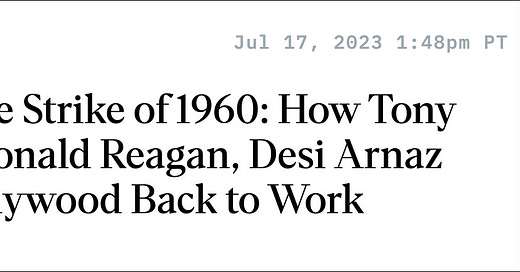


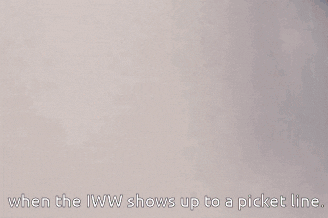

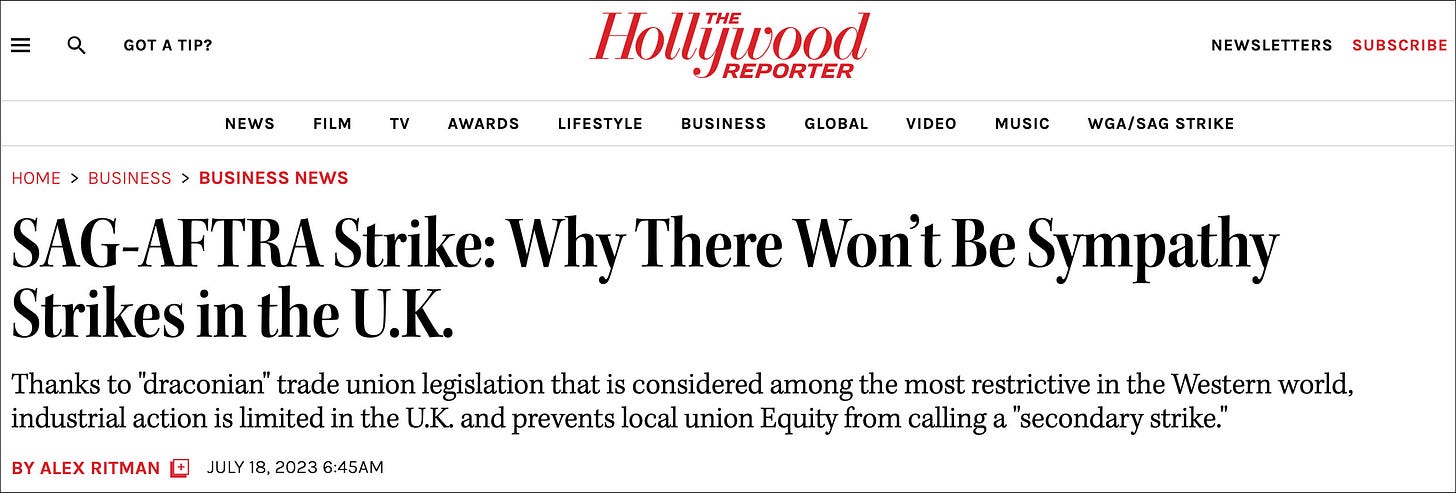


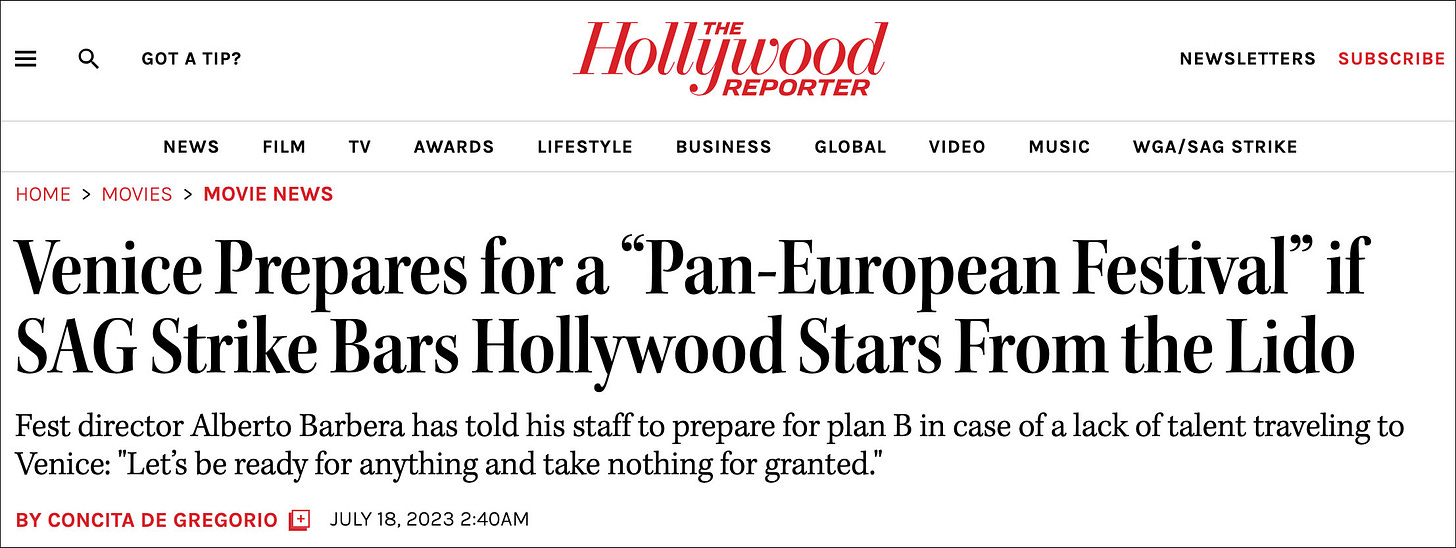

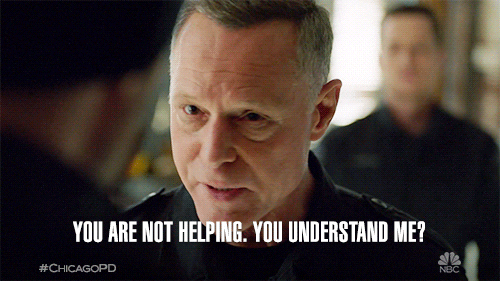

Magical Thinking is rampant in Hollywood, but after all that’s who they are. There are no good guys - totally unaware.
I wonder how all those actors and actresses will feel about losing all those spots to foreign born actors and actresses and foreign film companies? Do you think they'll be thrilled with equity and diversity then?
And Ron Perlman, I wish that man would be quiet. I love Hellboy and I don't want him to ruin it.